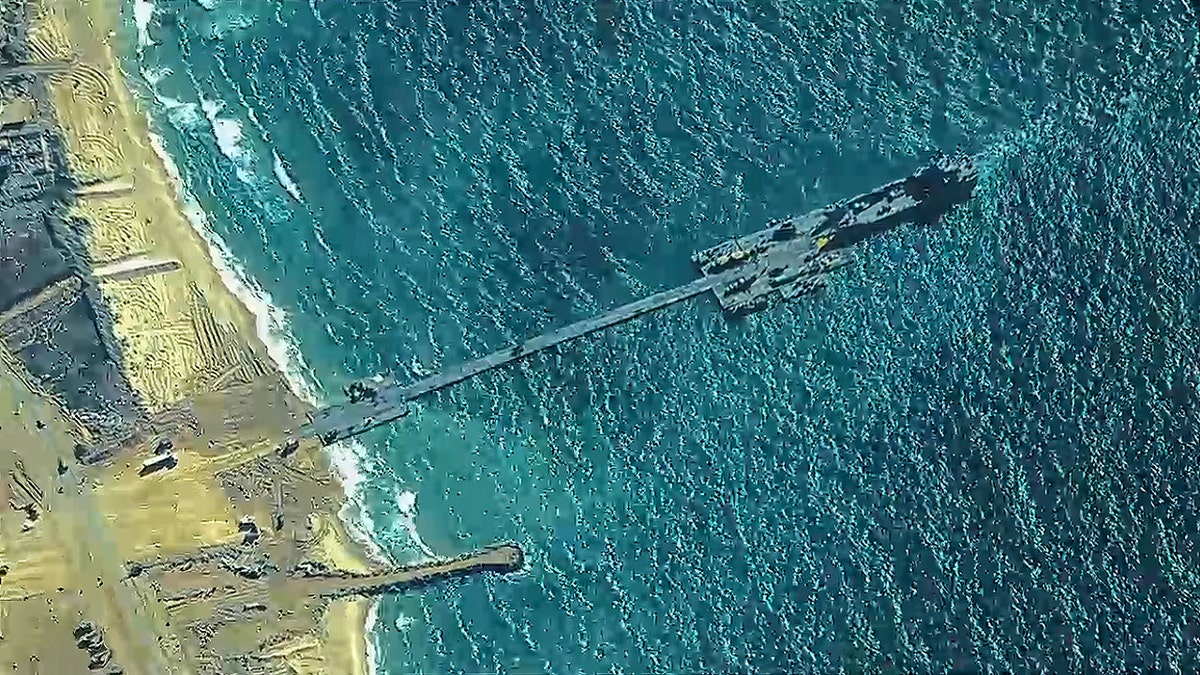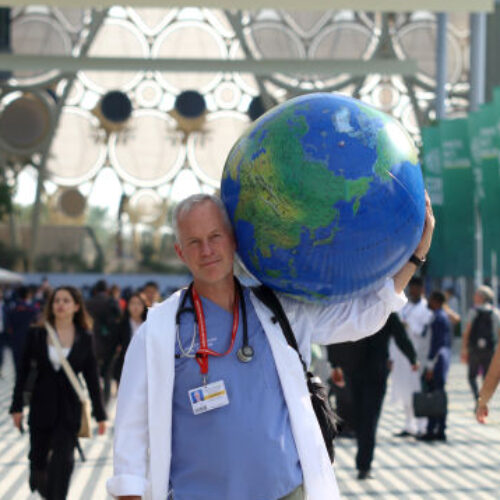
This article was originally published on FOX News - World. You can read the original article HERE
A U.S.-built pier is in place to bring humanitarian aid to Gaza by sea, but no one will know if the new route will work until a steady stream of deliveries begins reaching starving Palestinians.
The trucks that will roll off the pier project installed Thursday will face intensified fighting, Hamas threats to target any foreign forces and uncertainty about whether the Israeli military will ensure that aid convoys have access and safety from attack by Israeli forces.
Even if the sea route performs as hoped, U.S, U.N. and aid officials caution, it will bring in a fraction of the aid that's needed to the embattled enclave.
Here's a look at what's ahead for aid arriving by sea:
WILL THE SEA ROUTE END THE CRISIS IN GAZA?
No, not even if everything with the sea route works perfectly, American and international officials say.

The image provided by U.S, Central Command, shows U.S. Army soldiers assigned to the 7th Transportation Brigade (Expeditionary), U.S. Navy sailors assigned to Amphibious Construction Battalion 1, and Israel Defense Forces placing the Trident Pier on the coast of Gaza Strip on Thursday, May 16, 2024. The temporary pier is part of the Joint Logistics Over-the-Shore capability. The U.S. military finished installing the floating pier on Thursday, with officials poised to begin ferrying badly needed humanitarian aid into the enclave besieged over seven months of intense fighting in the Israel-Hamas war. (U.S. Central Command via AP)
U.S. military officials hope to start with about 90 truckloads of aid a day through the sea route, growing quickly to about 150 trucks a day.
Samantha Power, head of the U.S. Agency for International Development, and other aid officials have consistently said Gaza needs deliveries of more than 500 truckloads a day — the prewar average — to help a population struggling without adequate food or clean water during seven months of war between Israel and Hamas.
Israel has hindered deliveries of food, fuel and other supplies through land crossings since Hamas’ deadly attack on Israel launched the conflict in October. The restrictions on border crossings and fighting have brought on a growing humanitarian catastrophe for civilians.
International experts say all 2.3 million of Gaza's people are experiencing acute levels of food insecurity, 1.1 million of them at "catastrophic" levels. Power and U.N. World Food Program Director Cindy McCain say north Gaza is in famine.
At that stage, saving the lives of children and others most affected requires steady treatment in clinical settings, making a cease-fire critical, USAID officials say.
At full operation, international officials have said, aid from the sea route is expected to reach a half-million people. That's just over one-fifth of the population.
WHAT ARE THE CHALLENGES FOR THE SEA ROUTE NOW?
The U.S. plan is for the U.N. to take charge of the aid once it's brought in. The U.N. World Food Program will then turn it over to aid groups for delivery.
U.N. officials have expressed concern about preserving their neutrality despite the involvement in the sea route by the Israeli military — one of the combatants in the conflict — and say they are negotiating that.
There are still questions on how aid groups will safely operate in Gaza to distribute food to those who need it most, said Sonali Korde, assistant to the administrator for USAID's Bureau for Humanitarian Assistance, which is helping with logistics.
U.S. and international organizations including the U.S. government's USAID and the Oxfam, Save the Children and International Rescue Committee nonprofits say Israeli officials haven't meaningfully improved protections of aid workers since the military's April 1 attack that killed seven aid workers with the World Central Kitchen organization.
Talks with the Israeli military "need to get to a place where humanitarian aid workers feel safe and secure and able to operate safely. And I don’t think we’re there yet," Korde told reporters Thursday.
Meanwhile, fighting is surging in Gaza. It isn’t threatening the new shoreline aid distribution area, Pentagon officials say, but they have made it clear that security conditions could prompt a shutdown of the maritime route, even just temporarily.
The U.S. and Israel have developed a security plan for humanitarian groups coming to a "marshaling yard" next to the pier to pick up the aid, said U.S. Vice Admiral Brad Cooper, deputy commander of the U.S. military’s Central Command. USAID Response Director Dan Dieckhaus said aid groups would follow their own security procedures in distributing the supplies.
Meanwhile, Israeli forces have moved into the border crossing in the southern city of Rafah as part of their offensive, preventing aid from moving through, including fuel.
U.N. deputy spokesman Farhan Haq said that without fuel, delivery of all aid in Gaza can't happen.
WHAT'S NEEDED?
U.S. President Joe Biden's administration, the U.N. and aid groups have pressed Israel to allow more aid through land crossings, saying that's the only way to ease the suffering of Gaza's civilians. They've also urged Israel's military to actively coordinate with aid groups to stop Israeli attacks on humanitarian workers.
"Getting aid to people in need into and across Gaza cannot and should not depend on a floating dock far from where needs are most acute," U.N. deputy spokesman Farhan Haq told reporters Thursday.
"To stave off the horrors of famine, we must use the fastest and most obvious route to reach the people of Gaza — and for that, we need access by land now," Haq said.
U.S. officials agree that the pier is only a partial solution at best, and say they are pressing Israel for more.
CLICK HERE TO GET THE FOX NEWS APP
WHAT DOES ISRAEL SAY?
Israel says it places no limits on the entry of humanitarian aid and blames the U.N. for delays in distributing goods entering Gaza. The U.N. says ongoing fighting, Israeli fire and chaotic security conditions have hindered delivery.
Under pressure from the U.S., Israel has in recent weeks opened a pair of crossings to deliver aid into hard-hit northern Gaza. It said a series of Hamas attacks on the main crossing, Kerem Shalom, have disrupted the flow of goods.
This article was originally published by FOX News - World. We only curate news from sources that align with the core values of our intended conservative audience. If you like the news you read here we encourage you to utilize the original sources for even more great news and opinions you can trust!










Comments